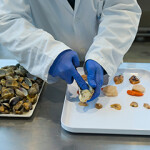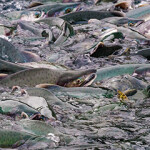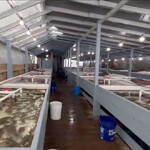Climate change impacting Atlantic shellfish, and scientists predict it will only get worse

A team of researchers form the Science Center for Marine Fisheries, an organization with a number of partners and collaborating scientists from universities like the Virginia Institute of Marine Science, is examining how warmer waters will impact shellfish species harvested in the United States.
The research, centering on ocean quahogs and surfclams, is examining how the two species will begin to interact as changing ocean conditions cause the species to shift habitats. Ocean quahog are one of the longest-lived marine species in the world and inhabit cold waters in the Mid-Atlantic, while surfclams typically inhabit warmer areas.
Now, as the waters in which surfclams typically live warm due to climate change, they are moving further north – and are beginning to overlap with quahogs.
“The area of overlap is getting potentially larger and larger as the Middle Atlantic warms, because one species is moving in and the other one hasn’t quite got the message and moved out yet,” said Roger Mann of Virginia Institute of Marine Science, one of the lead scientists on the survey, in a release.
Research performed by the center in 2021 discovered, through taking samples in several areas, that the overlap between quahogs and surfclams is already significant – “much more than was expected.”
“One of the surprises though was just how extensive the overlap is now,” said University of Southern Mississippi Professor Eric Powell, another one of the survey’s lead scientists. “This is a major community shift on the continental shelf and it’s something that the management agencies and the fishery are going to have to get their arms around and deal with.”
The issue with that overlap is that fishermen are not allowed to harvest clams and quahogs at the same time. In the past, this was less of an issue, since the species inhabited different areas of the ocean. Now, however, the overlap will make it difficult for fishermen to adhere to fishing rules – and the center's scientists predict it will only get worse.
“As bad as it is, it’s going to be much worse in five years, in my opinion,” Powell said. “The challenge, both to the fishery and management, is to figure out how to revise the regulations so both of these species can be landed without causing a problem with the inherent stability of the fishery and management.”
Shifting stocks aren’t unique to shellfish, and figuring out how to handle shifting stocks is a focus of regional fisheries management organizations and the U.S. government. In 2020, a group of U.S. representatives introduced the Ocean-Based Climate Solutions Act as a means of addressing the issue. Within the new legislation is a push for “climate-ready fisheries” that adds new language to the Magnuson-Stevens Act calling for the establishment of a climate and fisheries research and management program.
U.S. Rep. Jared Huffman (D-California) has also introduced a reauthorization bill for the Magnuson-Stevens Act, which contains new provisions dedicated to bolstering scientific research and integrating climate change as a consideration in management.
However, for now, progress on the legislation has been paused, Huffman announced on his website, due to the death of U.S. Rep. Don Young (R-Alaska), who was an integral part of the reauthorization effort as well as the Magnuson-Stevens Acts’ original author.
“I’ve always said it’s important all voices be heard in this MSA reauthorization process – and so, we will be pausing further committee consideration of the legislation until his replacement is elected and we can ensure the voices of the Alaskan people are represented before the bill advances further through the House,” Huffman said.
Photo courtesy of the Science Center for Marine Fisheries






Share